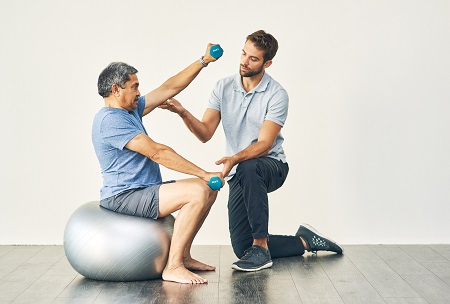When people are unwell or injured, they think of medication or perhaps surgery as the way to recovery. While these are the initial steps, in many cases there is another phase to the recovery process that is equally important, but often unappreciated. That is physiotherapy. Physiotherapy is not merely massage or exercise to reduce muscle pain. It is a course of treatment that offers a wide range of benefits, both for the recovery process and to strengthen the body to reduce the possibility of physical injury.
The Objectives of Physical Therapy
Physiotherapy is a medical discipline that offers patients many benefits including pain reduction, improved function and mobility, freedom to indulge in physical activities and faster and improved recovery from illness and injury. Beyond this, in many cases, patients find that physiotherapy enables them to learn a new way of moving that gives them the freedom to enhance the quality of their lives. Physical movement is natural and our ability to move starts from the moment we are born. However, in some cases, genetic factors and bad habits can lead to the body experiencing biomechanical difficulties. Physiotherapy is often the best way to overcome these issues.
Those recovering from illness or injury will be advised by their doctors to undergo physical therapy to enhance their recovery. People who suffer from chronic physical pain or limited movement may contact a physiotherapist directly to learn if this form of treatment will give them relief.
Also Read: Do Brittle Bones and Hormones Have a Connection?
The Main Benefits of Physiotherapy
- Eliminate or Reduce Aches and Pains: Managed exercise and manual therapy can help reduce pain and mobility limitations. Techniques like tissue and joint mobilization, and the use of ultrasound, electrical and laser stimulation can relieve severe pain and improve movement. The use of devices such as braces and supports may allow patients to enjoy relief from movement-related pain even before the treatment is complete.
- Avoid Pain Medication: One of the biggest medical problems today is the growing dependency on and addiction to pain relief medication which can lead to severe side-effects and life-threatening consequences. Physiotherapy can provide pain relief without the need for, or with reduced dosages of, pain medication.
- Avoid Surgery: Severe muscle and tissue ailments may require surgery to provide relief. However, this should be the last resort and undergoing physiotherapy may, in many cases, eliminate the need for a surgical procedure with its accompanying problems.
- Improved Mobility: If illness, injury or age has resulted in mobility problems, the impact on a person’s quality of life can be severe. Physiotherapy often offers a long-term solution to such issues and improves quality of life.
- Expert Help with Assistive Devices: Physiotherapists have the expertise to advise patients on the use of walking sticks, crutches, walkers and other devices that will help them recover at least part of the mobility they may have lost.
- Recovery from Stroke: When a person suffers a stroke, it is common for mobility to be lost in some part of the body. Physiotherapy is often the most effective way for regaining mobility and flexibility.
- Manage Age-Related Pain and Movement Issues: The development of aches and pains is a common problem for the elderly. It may be caused by disease or by the gradual wear and tear of joints and muscles. Physiotherapy can help control the impact of this and provide both pain relief and improved movement.
- Improve Balance: After surgery or after suffering a stroke, patients often have problems maintaining their balance. The prescribed exercises and the use of assistive devices that a physiotherapist can recommend can help patients regain their balance and confidence in their physical abilities. A physiotherapist can also advise on specific maneuvers to assist in overcoming vertigo and dizziness.
- Recovery from Sports Injuries: Sports and exercise are important to good health and overall well-being. However, there is always a risk of suffering injury while indulging in exercises. Physiotherapy can assist in not just speeding up recovery but also in strengthening joints and muscles to reduce the chances of such injuries occurring in the future.
- Manage Women’s Health Issues: Women can suffer from specific health concerns related to their menstrual cycle, pregnancy, menopause, urinary incontinence and so on. Physiotherapy can provide methods to manage these health issues and can also help women recover from conditions like breast cancer, fibromyalgia, lymphedema, etc.
- Reduce Scar Tissue Development: After injury or surgery, scar tissue will form over the wound. This can lead to feelings of tightness and pain. The stretching movements and other manipulation techniques that are part of physiotherapy can reduce scar tissue build-up and ensure that scarring does not impede recovery or rehabilitation.
Also Read: Why Multispecialty Hospitals Are the Best
Increasing age can slowly and almost imperceptibly lead to the development of movement-related pain or mobility problems. Often, patients contact medical specialists for help only when the condition has reached a stage where their normal life and activities are seriously impacted. While physiotherapy can offer a cure or at least relief in most cases, the earlier such problems are diagnosed and treatment begins, the faster and more effective the pain relief and improvement in mobility.
If you have been advised physiotherapy as part of your recovery from illness or surgery, or are finding that aches, pains and limitations of movement are affecting your normal life, you should contact a trained and qualified physiotherapist to get the results that you need. A massage at home from a loved one may feel nice, but the benefit is short-lived and it does not offer any significant medical benefit. For physiotherapy that will reduce pain, improve mobility and hasten recovery from illness or surgery, the best resource is a multispecialty hospital with a dedicated physiotherapy department. This is where you will find qualified therapists and the best treatment facilities and equipment. A multispecialty hospital has a full range of departments and medical specialists and if at all the therapy requires any additional medical inputs, everything will be available under one roof, making the process a convenient and seamless one.


